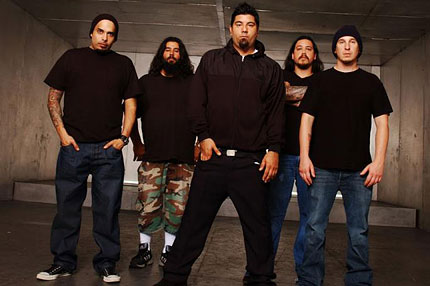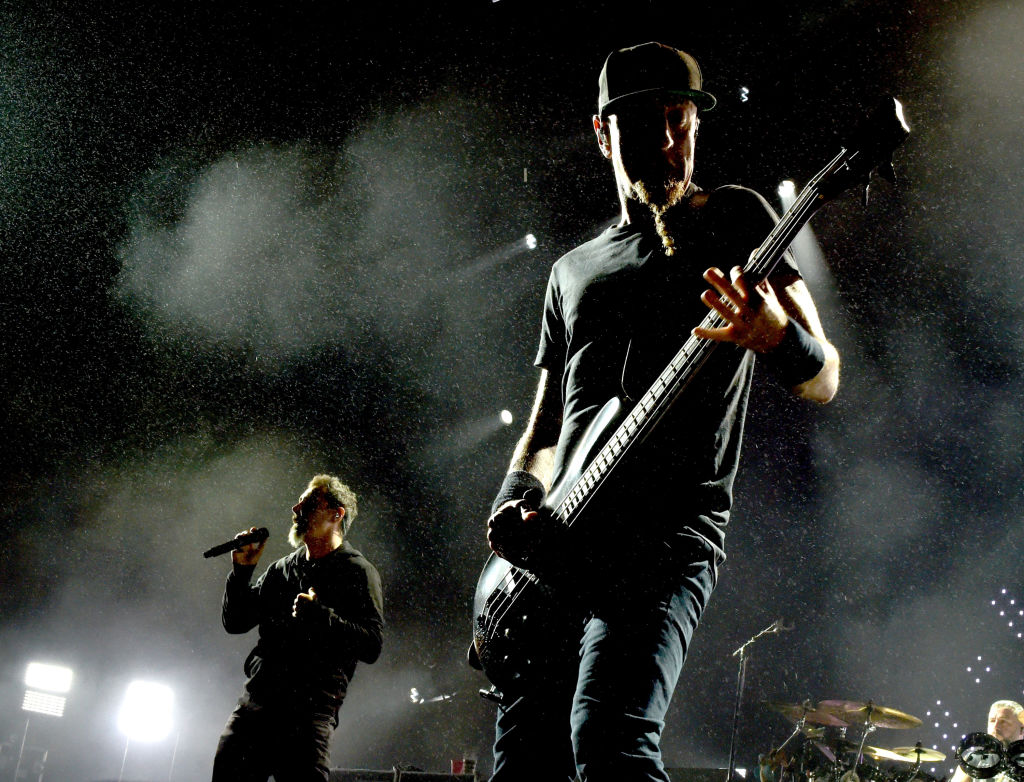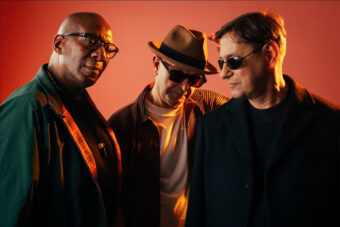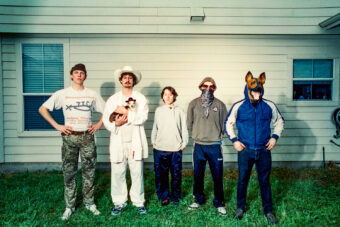Sacramento alt-metal quintet the Deftones will release their sixth studio album this May, capping nearly four years of writing and recording that included a return to the drawing board after sudden tragedy hit the band.
In late 2008, as the group wrapped sessions on what was then slated to be their next release, Eros, bassist Chi Cheng was critically injured in a car crash, leaving him in a semi-conscious state (he remains in a Northern California hospital today). Last June, after more than six months in limbo, the Deftones shelved Eros — which had become a constant reminder of Cheng’s absence — and started over.
“With everything we were going through, the Deftones needed to pour all of our thoughts, energy, and emotions into something new… something more optimistic,” singer Chino Moreno, 36, tells SPIN.com from his home in Los Angeles. “I couldn’t tour behind a record with all these memories of Chi attached to it.”
With former Quicksand bassist Sergio Vega filling in, the Deftones found a renewed energy, writing songs in a rehearsal space together — an approach they had ditched on their past few albums, which were recorded layer by layer with ProTools. Soon the band entered a L.A. studio with producer Nick Raskulinecz. The result: 11 songs for their yet-to-be-titled release, the sound of which recalls the group’s early days — while also exploring new territory.
One of Moreno’s favorite tracks, “Rocket Skates,” is a “heavier” tune with “beautiful yet violent imagery,” that has “a fantasy vibe” similar to “Knife Party,” a hit from 2000’s White Pony. But another newbie, “Nylons and Suspenders,” marks a first for the 20-year-old band.
“Musically, it’s something that we haven’t done before,” he explains. “It’s very… sludgy, like a chainsaw-type of riff but very slow. I shouldn’t say this, but it’s clunky… in an awesome way.”
Here’s more of our interview with Chino:
What can fans expect from the new album?
The dynamics Deftones are known for — aggressive overtones and lush openness. They’re on opposite sides of the spectrum, but we meld them together without sounding contrived. There are a few heavy songs, too, like our first couple records, and there are also experimental tunes — but there’s not a minute on this record that feels like it doesn’t need to be there. Each sound complements the other. I’ll straight-up say it: it’s definitely one of our best albums.
It must have been a tough decision to ditch Eros after Cheng’s injury and start over.
It really was. But we didn’t can it completely — we still have Eros. It’s a really experimental, dark record for us, and it’s special because it’s the last thing that Chi played on. We’ve put in the vault and will release it when the time is right — hopefully when Chi is back on his feet. But when the accident happened, we just didn’t want to be in that time anymore. We had to start looking to the future. We needed to create something more optimistic.
What direction are you going in lyrically?
Well, I’ve been wanting to record a fantasy album like White Pony, where the lyrics are less, ‘This is my life and this is what we’re going through.’ It helps take us away from reality. I don’t like listening to people’s problems — I like music. Music has been smothered with that complaining since the early-’90s. It gets old. Instead of going to the opposite side of the spectrum and listening to Black Eyed Peas, which is just straight silly, I choose to listen to more instrumental music. I do very little singing about myself on this record. I love songs where I can totally take myself out of being human. I can sing about really odd things, and they don’t necessarily have to pertain to me at all. It paints a picture. Those are the kind of lyrics I grew up with — like the Cure. Really visual images and no storytelling.
How did the addition of Sergio Vega affect the music?
It brought us closer together than we’ve been in a really long time. Musically, we were really clicking, and Sergio really fits with the band. But he’s a different type of player than Chi; Chi plays with his fingers, Sergio plays with his pick. We’re just appreciative that we’re still alive and able to make music. The recording process was very different — we didn’t use ProTools. We wrote each song in a practice place and played them a million times ’til they were perfect. That approach goes back to our earlier days, and it’s a lot more personable. We work better when everybody’s together — and the songs benefit.
Do Deftones have any studio pastimes, or is there anything you can’t live without while recording?
Hmmm… weed? [laughs].
What do you guys do to relax?
[Guitarist] Stephen [Carpenter] plays golf every morning — he’s super, super hardcore about that. I still skateboard all the time — it’s one of my favorite things. Lately I’ve been hiking, too. I’m also doing a couple side projects. Most recently I have the Holy Ghost, which I’m doing with my buddy Shaun Lopez from the band Far. He lives a couple blocks away from me, so I go over to his studio a few nights a week and work on this electro record. Annie Hardy from Giant Drag has done a couple vocals on this project, too.
How’s Cheng doing these days?
I saw him over the holidays — he looks a lot better. It’s been almost a year and a half since his accident, so he’s making progress. He’s still in a semi-conscious state. He opens his eyes and looks at you, but he’s not communicating yet. There’s a specialist from the East Coast who’s coming out, who knows some experimental medicine and is going to try to wake up him up. Supposedly, this doc has an 85 percent success rate with waking people from these types of things. We’re just all trying to be as optimistic as possible. I hope I can have a conversation with Chi again, he’s one of my best friends. I miss him.





